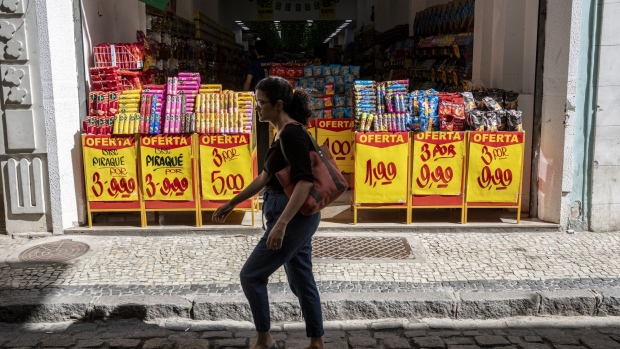Dec 5, 2023
Brazil Economy Grows Slightly in Third Quarter as Slowdown Looms
, Bloomberg News

(Bloomberg) -- Brazil’s economy unexpectedly expanded in the third quarter, giving a temporary boost to President Luiz Inacio Lula da Silva and his efforts to improve living standards ahead of an anticipated period of softer growth.
Official data released Tuesday show gross domestic product expanded 0.1% in the July-September period from the prior quarter, above all estimates in a Bloomberg survey that had a -0.3% median forecast. From a year ago, the economy grew 2%.
Swap rates on the contracts due in January 2025, which indicate market sentiment about monetary policy at the end of next year, rose five basis points in morning trading following the better-than-expected activity reading.
Brazil’s economy has again defied predictions of an imminent contraction, aided by government spending and consumer demand as families benefit from more disposable income. The better-than-expected reading follows a robust first half driven by bumper crops and a strong labor market, resulting in greater support for Lula. Even so, the expansion has lost steam as the boost from agribusiness fizzles and interest rates remain at 12.25% despite recent cuts.
“On the supply side, despite the confirmation of a broad deceleration, all sectors beat our expectations, meaning widespread resilience of the Brazilian economy,” Gabriel Couto, an economist at Banco Santander in Brazil, wrote in research note.
Lula celebrated the report as a testament to lower rates and his economic reforms. “The Brazilian people will be proud of the economic improvement,” he wrote on wrote on X, the social media platform formally known as Twitter, adding that growth will reach 3% this year.
Continued Expansion
Gains of 0.6% in both industry and services drove the the third-quarter advance, the national statistics agency said. But the resource-rich nation saw its agriculture sector plunge 3.3% as the effects of a so-called super harvest wore off, while investments dropped 2.5%.
What Bloomberg Economics Says
“Another round of GDP growth in the third quarter underscores the Brazilian economy’s resilience despite tight credit conditions. Continued expansion and slowing underlying inflation could mean potential output is higher than policymakers estimate. It may also suggest monetary policy isn’t as tight as we believe. Still, we don’t think the data warrant a shift in monetary policy just yet.”
— Adriana Dupita, Brazil and Argentina economist
Click here for the full report.
The slowdown in key sectors was widely expected. The greater question for investors and analysts is how Lula, a 78-year-old leftist who has promised to fight poverty and bring back commodity-fueled go-go days of his previous administration, navigates a far more difficult economic reality.
So far, the central bank has already delivered three interest rate reductions of 50 basis points each, and at least two additional cuts of the same magnitude are on tap. Policymakers see weaker growth in the near-term and annual inflation slowing closer to target.
Fiscal hawks worry Lula may try to stoke the economy through more state spending. Already, he has made permanent many Covid-era benefits and significantly increased government outlays in next year’s budget while public finances deteriorate.
Finance Minister Fernando Haddad has tried to calm investor fears of ballooning debts by pledging to eliminate the primary deficit in 2024. But many doubt he’ll be able to keep that promise because Lula has indicated he doesn’t want to make cuts to social or infrastructure expenditures.
Read more: Brazil’s Zero-Deficit Target Unlikely to Survive Slowing Economy
Mario Braga, a Sao Paulo-based political analyst for the consulting firm Control Risks, says Tuesday’s print does not change the outlook for economic downturn, but helps Haddad as he faces detractors within the administration.
“Haddad will continue to face internal disputes in pursuit of fiscal discipline, but his battles over coming months are unlikely to be as tough as if the economy were actually shrinking,” Braga said.
--With assistance from Giovanna Serafim and Maria Eloisa Capurro.
(Updates with Lula comments, economic context and analysis throughout)
©2023 Bloomberg L.P.





